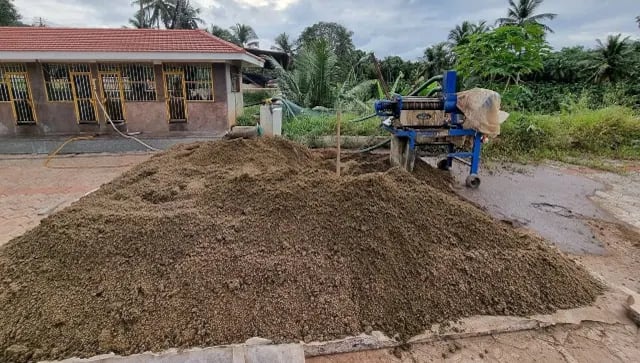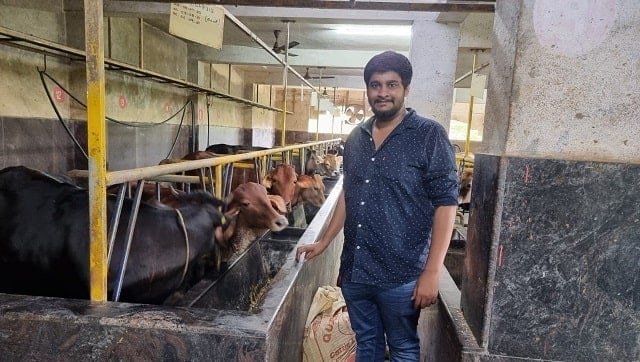June 17, 2025 | 19:33 GMT +7
June 17, 2025 | 19:33 GMT +7
Hotline: 0913.378.918
June 17, 2025 | 19:33 GMT +7
Hotline: 0913.378.918

After watching multiple videos and doing a lot of online research, Achar travelled to Patiala, Punjab and bought a machine that dries cow dung, which can be used as fertilizer. Photo: FP
The cattle has increased to 130 and the family also own a 10 acre plot where areca nut is the main crop. Achar brought in quite a few innovations into the dairy that the family easily earns Rs 10 lakhs per month.
Bengaluru: A large number of people are dependent on cattle for their livelihood. They sell milk and its by-products; some may even sell the organic fertilizer made from cow dung. But here is an engineer who runs a dairy farm with his parents and earns by selling not just milk and manure, but also the water that flows out of the cowshed after bathing the cows!
26-year-old Jayaguru Achar Hinder -- who hails from Mundru village, Puttur Taluk in Dakshin Kannada district -- studied civil engineering at Vivekananda College of Engineering and Technology. But, after working for a year with a private firm, Achar was already fed up with his 9 to 5 job. He always loved farming and spending time with the 10 cows his father owned. One day in 2019, he decided to quit his job and join hands with his father and give a technical twist to increase the productivity of the farm.
"I was thinking of expanding the dairy and trying innovative ways to increase revenue while studying engineering. All that brainstorming was later helpful in practical decisions" says Achar.
The dairy is now very well expanded and set up. The strength of the cattle has increased to 130 and the family also own a 10-acre plot where areca nut is the main crop. Achar brought in quite a few innovations into the farm dairy that the family easily earns Rs 10 lakhs per month.

After working for a year with a private firm, Achar was already fed up of his 9 to 5 job. He always loved farming and spending time with the 10 cows his father owned. Photo: FP
Dry Cowdung
After hours of online research, Achar travelled to Patiala, Punjab and bought a machine that dries cow dung. He sells around 1,000 bags of this dry cow dung every month. Farmers around and of neighboring villages buy from him in large quantities.
Cow Dung Slurry
A mixture of cow dung, cow urine and the water that is collected after bathing the cows is a slurry. This water is stored and transported in tankers. Achar owns a tanker that holds up to 7,000 litres of slurry. Every day he sells 1 tanker quantity of this mixture. Whoever buys this pays around 8 to 11 rupees per litre. The slurry is taken to the buyer’s farm and poured to the base of the plant. The buyer decides how much to be poured to each plant and it is delivered accordingly.
Gonandajala (From the dead cow)
This is something Achar found online. He studied this extensively and is successfully creating this product. Gonandajala is basically a high nutrient fluid that boosts the growth of crops. After a cow is dead, instead of burning or burying the corpse, it is left in a huge tank with the calculated proportion of cow urine, buttermilk, and several other items and water. This is closed and left to decompose for 6 to 7 months after which the fluid is used as liquid fertilizer. Around 1.5 litres of this fluid is to be mixed with 100 litres of water and used as fertilizer. People have seen great results in crops after using this, says Mr Achar.
Other than this, he also sells 750 litres of milk daily and around 30 to 40kg of ghee monthly. “We have around 10 staff to help us with all this work. We have several machines like milking machine that reduces the burden on the labour and good water facilities inside the cowshed so that one need not spend too much time cleaning the shed. Such small but effective changes increase productivity” explains the young entrepreneur.
“Giving a complete organic array of products not just increases our revenue, but also gives us a sense of satisfaction that we are not causing any harm to the environment” he adds.
He is planning to set up a unit to produce milk products in near future. “The various subsidies by government and the startup loans and benefits have helped a great deal in taking up newer projects. This is a job without weekly offs and leaves, I know. But I also know that in a few years’ time, this will be completely self-sustained and the setup will run without much effort. And more than anything, being your own boss is the greatest feeling”, says the happy young man.
(Firstpost)

(VAN) Extensive licensing requirements raise concerns about intellectual property theft.

(VAN) As of Friday, a salmonella outbreak linked to a California egg producer had sickened at least 79 people. Of the infected people, 21 hospitalizations were reported, U.S. health officials said.

(VAN) With the war ongoing, many Ukrainian farmers and rural farming families face limited access to their land due to mines and lack the financial resources to purchase needed agricultural inputs.

(VAN) Vikas Rambal has quietly built a $5 billion business empire in manufacturing, property and solar, and catapulted onto the Rich List.

(VAN) Available cropland now at less than five percent, according to latest geospatial assessment from FAO and UNOSAT.

(VAN) Alt Carbon has raised $12 million in a seed round as it plans to scale its carbon dioxide removal work in the South Asian nation.

(VAN) Attempts to bring down the price of the Japanese staple have had little effect amid a cost-of-living crisis.